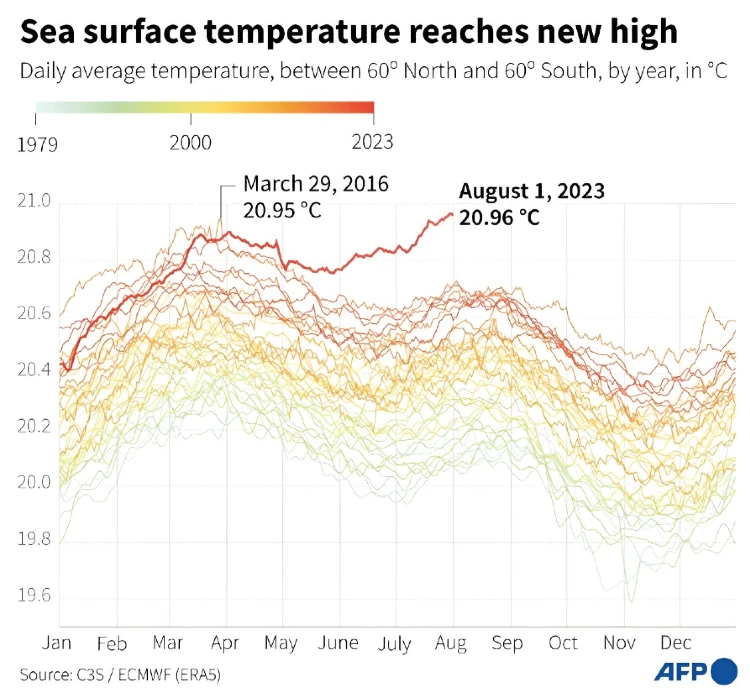In a remarkable turn of events, the Earth’s oceans have broken a significant temperature barrier this week (and not in a good way), triggering widespread worry about cascading repercussions on our planet’s climate, underwater ecosystems, and communities along coastlines.
Based on meticulously gathered data from the European Union climate observatory, it has been confirmed that the surface temperature of our oceans surged to an astounding 20.96 degrees Celsius (69.7 degrees Fahrenheit) on July 30. This revelation stands as a stark contrast to the previous record of 20.95 degrees Celsius, which was set in March 2016.
These figures emerged from the European Union’s Copernicus Climate Change Service, and its implications are anything but inconsequential.
Now, these measurements deliberately excluded the polar regions, a factor worth considering in the context of the global climate.
Furthermore, the United States’ National Oceanic and Atmospheric Administration (NOAA), which operates with a distinct database, has observed a parallel trend in recent months that aligns with these disconcerting findings.

To break down the specifics, the average sea surface temperature reached an unprecedented 21.06 degrees Celsius on April 4 of this year, triumphantly overtaking the prior peak of 21.01 degrees Celsius from March 2016.
And just this past August 1st, the mean temperatures clocked in at 21.03 degrees Celsius, further cementing the unsettling trajectory.
The severity of this situation lies not only in the numbers but in their deeper implications.
Researchers have long asserted that a staggering 90 percent of the surplus heat generated by human activities since the industrial revolution has been absorbed by our oceans.
This unparalleled heat absorption has been a silent sentinel, buffering the rest of the planet from the full brunt of our energy excesses.
However, this colossal heat influx has a notable side effect – it’s like pouring extra fuel into the climate engine. As the oceans warm, they wield the power to amplify climate change.
This heat surge is intrinsically tied to the relentless upsurge in greenhouse gases, primarily stemming from the combustion of fossil fuels.
This symbiotic relationship between ocean heat and global warming is a stark reminder of how interconnected our planet’s systems truly are.
While the gravity of these findings is clear, they also hold the potential to drive action. The world now faces a collective responsibility to comprehend and counteract the impact of this oceanic temperature surge.
As the scientific community continues to explore solutions and policymakers deliberate on necessary interventions, the undeniable link between our actions and the environment is becoming more pronounced than ever before.
Rising Ocean Heat Fuels Concerns Amidst Growing Climate Threats
As excess heat from human activities mounts, the perilous consequences of rising greenhouse gases, primarily stemming from the combustion of fossil fuels such as oil, gas, and coal, are becoming glaringly evident in the Earth’s atmosphere.
A disturbing global trend has taken hold since April, with the average ocean temperature consistently shattering seasonal heat records on a recurring basis.
This pattern underscores the relentless march of climate change, with the consequences rippling through marine ecosystems in ways that are proving to be nothing short of immediate threats.
Piers Forster, an authority from Britain’s University of Leeds and a prominent figure in the International Center for Climate, draws attention to the urgent gravity of the situation. “The ocean heat wave is an immediate threat to some marine life,” he warns.
An alarming testament to this statement is the current plight of Florida’s coral reefs, which are experiencing distressing bleaching events directly attributed to the escalating ocean heat.

As ocean temperatures surge, the ramifications are not limited to coral ecosystems; other marine organisms, from migratory species to the spread of invasive life forms, are poised to experience significant disruptions.
This domino effect has far-reaching implications, potentially destabilizing fish stocks and compromising food security in specific regions worldwide.
Amidst these ominous signs, the mounting heat crisis bears another critical consequence. The capacity of warmer oceans to absorb carbon dioxide (CO2) diminishes, exacerbating the vicious cycle of global warming.
This sinister feedback loop only serves to compound the challenges posed by climate change, as escalating temperatures hinder the natural regulatory mechanisms that our oceans have historically provided.
And as if the current situation wasn’t concerning enough, a climatic phenomenon known as El Niño looms on the horizon.
This phenomenon is known to elevate ocean temperatures, further perpetuating the heatwave gripping our waters. This, in turn, amplifies the potential for extreme climate events and the disruption of fragile ecosystems.
Leading scientists project that the worst impacts of this looming El Niño will cast their shadow over the latter part of 2023 and extend their grasp into the subsequent years.
As we brace for the fallout, it becomes increasingly clear that addressing the challenges posed by ocean overheating demands not just immediate attention, but comprehensive global cooperation and decisive action.
Unprecedented Oceanic Warming Spurs Urgent Calls for Action
Rowan Sutton, the eminent director of climate research at the University of Reading, leaves no room for doubt: “While there are certainly short-term factors, the main long-term cause is without a doubt the accumulation of greenhouse gases in the atmosphere caused by human activity, primarily by the burning of fossil fuels.”
His declaration underscores the grave human-induced origins of the escalating oceanic temperature crisis.
Recent data has added a grim note to the growing chorus of climate concerns.
A series of new temperature records are emerging worldwide, painting an alarming picture of our planet’s changing climate dynamics.
In a startling revelation, last month witnessed temperatures as high as 38.3 degrees Celsius, akin to the heat of a jacuzzi, recorded off the coast of Florida. This reading, if validated, could potentially represent a world-record high for a single-point temperature measurement.
The North Atlantic, often known for its temperate disposition, surprised the world by registering a record-high average temperature of 24.9 degrees Celsius in the past week—a statistic that normally aligns with its peak in September.
This unexpected ascent in temperatures has been a consistent trend since March, marking a substantial deviation from historical norms.
The North Atlantic’s pivotal role in the context of oceanic heating cannot be understated. It serves as a pivotal vantage point to observe the profound shifts underway in our oceans.
More To Discover
- Canada Trails in the Fight Against Greenwashing
- Philippines Accuses Chinese Fishers of Cyanide Pollution in Disputed Waters
- Greenland’s Green Again: Ice Melts Reveal Viking-Era Landscape And That’s A Problem
- 2023 Saw 356,000 Heat Pumps Installed In Germany: 50% Surge in Installations for Second Year Running
Meanwhile, the Mediterranean Sea, a prominent player in this narrative, set its own unsettling record last July, with its median temperature scaling to an unprecedented 28.71 degrees Celsius, as noted by Spain’s leading maritime research center.
A particularly concerning phenomenon is the surging frequency of marine heat waves. The Intergovernmental Panel on Climate Change (IPCC) sounded the alarm in a 2019 report, revealing that marine heat waves have doubled in frequency since 1982.
If stringent measures are not taken to curtail pollutant emissions, projections indicate that by 2100, these heat waves could intensify by a factor of ten compared to their levels at the dawn of the 20th century.
The debate over coal, oil, and gas is poised to take center stage at the upcoming United Nations climate talks, often referred to as COP28. Scheduled to convene at the end of the year in Dubai, these crucial discussions will undoubtedly grapple with the imperative need to rein in emissions from these industries.
As the world stares down the barrel of a warming crisis, global leaders and policy-makers face an unprecedented mandate to drive meaningful change and safeguard our planet’s future.



















